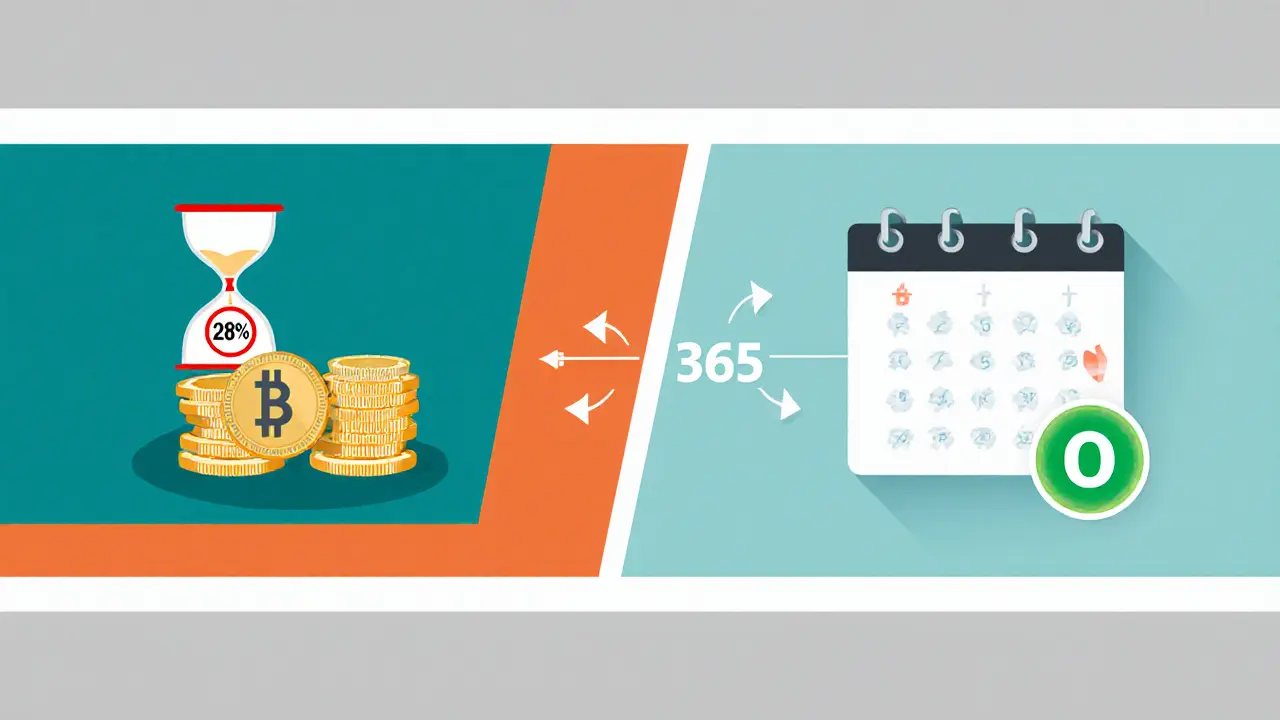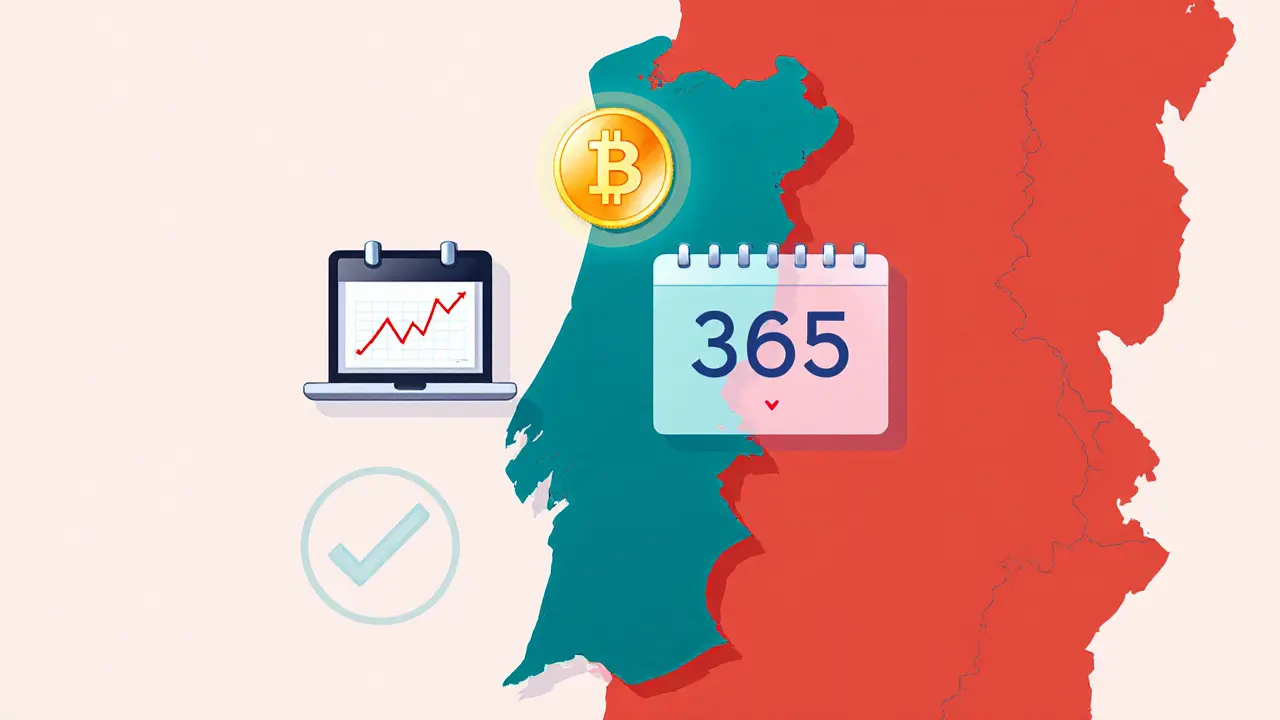Portugal Crypto Tax Calculator
Tax Rules Summary
- Hold for 365+ days: 0% tax on gains
- Sell before 365 days: 28% flat tax on gains
- Staking/lending income: 28% flat tax
- Professional trading: 14.5%-53% progressive tax
Tax Calculation Result
Important Notes
- Tax-free gains apply only after holding for 365+ days
- Staking and lending income is always taxed at 28%
- Professional trading uses progressive rates (14.5%-53%)
- Report gains in your annual tax return (Modelo 3)
Quick Takeaways
- Hold crypto for at least 365 days and the profit is completely tax‑free in Portugal.
- Sell before a year passes and you pay a flat 28% on the gain.
- Staking, lending and other passive income stay in CategoryE and are taxed at 28%.
- Self‑employment crypto activities (mining, professional trading) fall under CategoryB and face progressive rates up to 53%.
- Keep solid records of acquisition dates, prices and sales - Portuguese tax returns are on a realization basis.
What Makes Portugal Different?
Portugal is a southern European country that has become a hotspot for crypto enthusiasts because of its clear, favorable tax rules. In 2023 the government added a dual‑tier system to the Personal Income Tax Code. The key split is between short‑term and long‑term holdings. If you keep a token for more than one year and then convert it to euros, the profit is tax‑free crypto gains. Anything sold earlier gets hit with a flat 28% rate.
This approach keeps Portugal on the top of the list for crypto‑friendly jurisdictions, alongside Germany, while still letting the state collect revenue from active traders.
How the Tax Framework Is Structured
Portugal categorises crypto income into three buckets:
- CategoryE - Capital income (staking, lending). Flat 28%.
- CategoryG - Capital gains. Less‑than‑365‑day sales: 28%; over‑365‑day sales: tax‑free (unless the token is treated as a security or is held outside the EEA).
- CategoryB - Self‑employment income (mining, professional trading, transaction validation). Progressive rates 14.5%‑53%.
The tax‑free status only kicks in when you actually realise the gain - that means converting the crypto to fiat (euro) or using it to pay for goods/services. Holding crypto that simply goes up in value without a sale does not create a tax event.
Step‑by‑Step: Securing Tax‑Free Long‑Term Gains
- Buy the crypto you want to hold. Record the purchase date, amount, and EUR value.
- Store it in a wallet you control. Custodial exchanges are fine, but you still need the transaction data.
- Wait **at least 365 days**. The clock starts on the day you acquire the asset, not the day you move it.
- When you’re ready to cash out, convert the crypto to euros. This is the moment the tax authority looks at.
- Prepare a simple report: acquisition date, cost basis, sale date, sale proceeds, and the calculated gain (sale - cost).
- Include the report in your annual Portuguese tax return (Modelo 3). No tax due on the gain, but the figures must be declared.
If you sell before the year is up, apply the 28% flat rate to the gain. You can either pay the flat rate directly or add the profit to your overall taxable income - whichever gives you a lower bill.

Record‑Keeping & Reporting Made Easy
Portuguese law works on a realization basis, so you only report events that actually happen. Still, the tax office expects solid documentation. Here’s a minimal checklist:
- Transaction history from exchanges or wallets (CSV or PDF).
- Proof of the EUR price on the acquisition date (use a reputable price source).
- Bank statements showing the fiat withdrawal.
- Any staking or lending statements that fall under CategoryE.
Tools like CoinTracking or Koinly have templates for Portuguese reporting - just import your CSV and the software will generate the needed tables.
How Portugal Stacks Up Against Other EU Countries (2025)
| Country | Short‑Term Rate | Long‑Term Treatment | Staking / Passive Income |
|---|---|---|---|
| Portugal | 28% flat | 0% after 365days | 28% flat |
| Germany | Progressive (up to 45%) | 0% after 365days | Taxed as ordinary income |
| France | 30% flat | 30% on all gains | 30% flat |
| Italy | 26% flat | 26% on all gains | 26% flat |
| Spain | Progressive 19‑28% | Progressive 19‑28% | Progressive up to 47% |
Portugal’s one‑year rule is as generous as Germany’s, but the flat 28% short‑term rate is simpler than the progressive slabs you’d see in Spain or Italy.
Practical Tips & Common Pitfalls
- Don’t mix personal and business wallets. Mixing can blur the line between CategoryE/G and CategoryB, leading to higher tax rates.
- Watch out for tokens classified as securities. If a token is deemed a security, the long‑term exemption may not apply.
- Cross‑border moves matter. Holding crypto outside the European Economic Area (EEA) can trigger tax even after 365days.
- Crypto‑to‑crypto swaps are tax‑free in Portugal, but keep the transaction log - the authority may request proof of the swap dates.
- If you’re a digital nomad, make sure you’re a tax resident in Portugal (183‑day rule or habitual residence). Without residency, the rules don’t apply.
Next Steps for Investors Who Want to Relocate or Optimize
- Confirm your Portuguese tax residency status - either spend >183 days in the country or register a habitual residence.
- Open a local bank account; this simplifies fiat conversions and tax reporting.
- Move your crypto holdings to a wallet you control, note the exact acquisition timestamps.
- Plan your sale dates to align with the 365‑day threshold. A simple spreadsheet can flag which assets are eligible for tax‑free status.
- Schedule an appointment with a Portuguese tax advisor who understands crypto. A small fee now can save you a lot later.
By following these steps you lock in the biggest tax advantage Portugal offers: zero tax on long‑term crypto profits.
Frequently Asked Questions
Do I need to pay tax on crypto that I just hold but never sell?
No. Portugal taxes on a realization basis, so you only pay when you convert crypto to fiat or use it to buy goods/services.
What counts as a "holding period" - does moving the asset to another wallet reset the clock?
The clock starts on the acquisition date, not on where you store it. Transfers between wallets don’t restart the 365‑day count, but you must keep records of those transfers.
Are staking rewards taxed even if I keep them in the same wallet?
Yes. Staking income falls under CategoryE and is taxed at a flat 28%, regardless of how long you hold the reward.
Can I claim the tax‑free exemption if I’m a non‑resident but own Portuguese property?
The exemption only applies to tax residents. Non‑residents are subject to the standard 28% rate on any crypto‑to‑fiat conversion.
How does the EU’s MiCA regulation affect Portugal’s crypto tax rules?
MiCA sets uniform AML and consumer‑protection standards across the EU, but it does not dictate national tax policy. Portugal can keep its 365‑day exemption while complying with MiCA’s reporting and licensing requirements.


Author
Ronan Caverly
I'm a blockchain analyst and market strategist bridging crypto and equities. I research protocols, decode tokenomics, and track exchange flows to spot risk and opportunity. I invest privately and advise fintech teams on go-to-market and compliance-aware growth. I also publish weekly insights to help retail and funds navigate digital asset cycles.